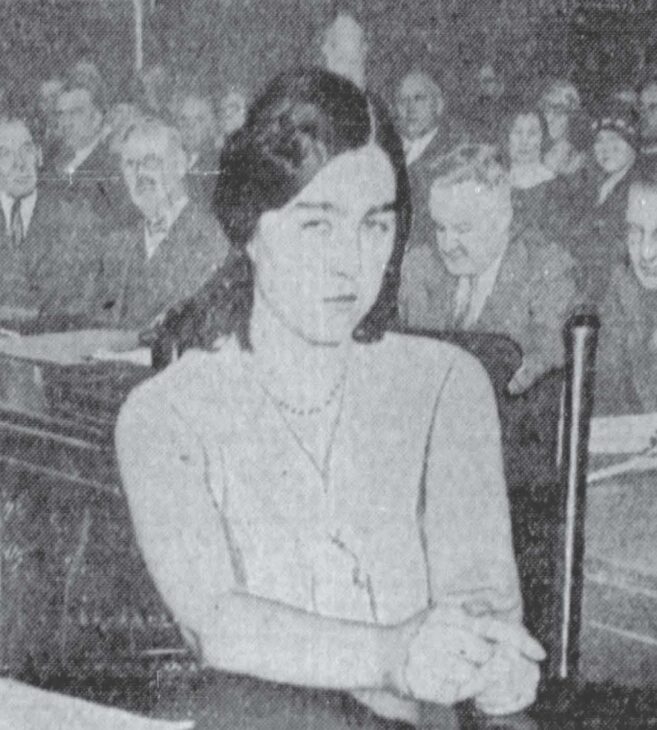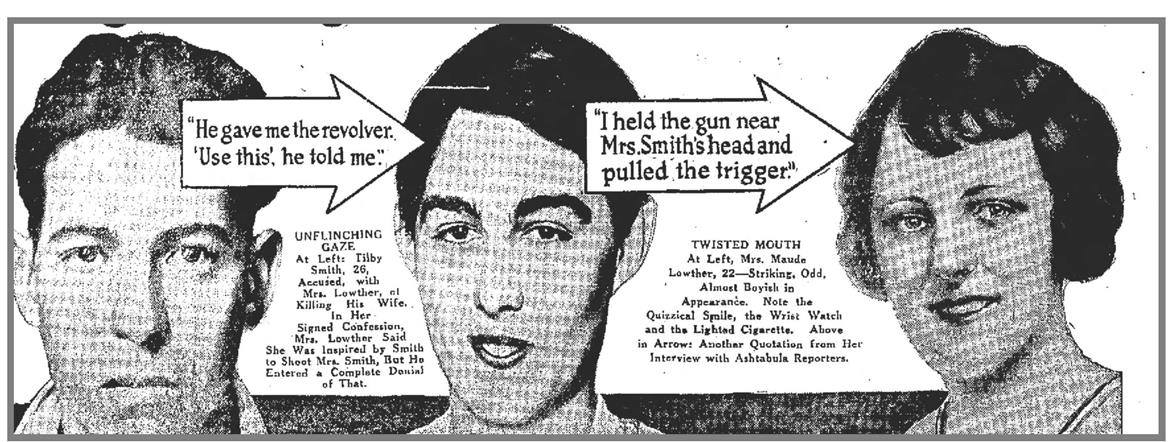For Love: The Murder of Clara Smith

Julia & Tilby
On a bright spring day in May of 1930, Julia Maude Lowther opted for a reprieve from her failing marriage, demanding job, and motherly duties by attending a screening at the nearby movie theater. Little did she know, this choice would mark a pivotal turning point in her life.
Julia Maude Ross was born in Harrison County, West Virginia, the oldest of seven children to Carl and Mittie Ross. At fifteen, Julia became pregnant with her first and only child, a son she named William, after his father. Julia and William “Earl” Sr. married, but the marriage was not built to last. They divorced, and in 1928, Julia married for the second time to Alva Lowther, a man twice her age. The couple, along with Julia’s son, moved to Ohio, where Julia found work as a housemaid for a wealthy family in Ashtabula. But within two years, her marriage to Alva was crumbling as well.
On that fateful afternoon in May, Julia probably didn’t expect anything more than a couple of hours in the dark alone, watching a movie. Instead, she met Tilby Smith. Tilby was 26 and handsome, a charming man who was also unhappily married. His wife, Clara, was a couple of years older than Tilby, and she had recently given birth to their second child, a son named Donald, in January of that year. Their daughter, Dolores, was only five.
Both Tilby and Julia were instantly smitten, but their whirlwind love affair would only last ten days and end with a brutal murder. Later, Julia would testify that Tilby had made promises to their future. They only needed to get rid of his wife.
“I killed Clara because I loved Tilby. He told me I would not have to work again, that he would take care of me and my boy and that we would go to Florida after this thing blew over.” – Julia Maude Lowther

The Crime
A murderous plot was quickly hatched between the lovers, and on the night of May 29th, Tilby drove his wife and young children out to a dark, lonely road where Julia had been waiting for nearly three hours. She wore men’s boots, a suggestion from Tilby to throw off the police, and crouched in the underbrush until she saw Tilby’s truck coming down the road. When the vehicle came to a stop, Julia sprung into action, approaching the truck with a revolver. She feigned a robbery but quickly put the revolver to Clara’s head and pulled the trigger. Clara died almost instantly. Her son, only five months old, slipped off her lap onto the floor but was thankfully unharmed.
After Julia ran off, Tilby called the police and attempted to convince them that robbers had killed his wife. It only took five hours of questioning before Tilby broke down and confessed. Both Tilby and Julia were arrested and tried for their roles in Clara’s horrific murder.
Sentenced to Death
A jury found Julia guilty of premeditated murder, and she became the first woman in Ohio to be sentenced to die by the electric chair. Tilby was also convicted of murder and received the same sentence. However, both would successfully appeal their sentences.
Tilby’s new trial was granted on the basis that he had the mental capacity of an 8-year-old. However, the second trial would result in the same sentence. On November 30, 1931, Tilby was executed, proclaiming his innocence until the very end.
Julia was granted a new trial when it was discovered that there was an error in impaneling the jury that would eventually convict her. Two of the jurors claimed to have already formed opinions on Julia’s guilt, yet they were still seated against the objections of the defense. To avoid the death sentence, Julia pled guilty to first-degree murder and was given a life sentence by the presiding judge, who felt as though, while Julia pulled the trigger, it was Tilby who was responsible for the murder of his wife.
She began to serve her time at the Marysville Reformatory, during which Alva divorced her. In 1954, after 24 years, Governor Frank Frank Lausche commuted Julia’s sentence from first-degree murder to second-degree murder, which made her eligible for parole. When Julia was released, she moved to an eastern Ohio city to live with her sister. At some point, she married a man named Raymond Dorance Kroninger and, on November 30, 1993, died in Columbus, Ohio, at the age of 88.

Final Thoughts
It’s crazy to think about someone being so willing to kill for a man they had only known for ten days, but “love” can be a powerful emotion. Tilby’s lawyers successfully appealed his initial sentence by convincing the court that he had the mental capacity of a child. Yet, he was able to manipulate Julia into murdering his wife? Then again, maybe Julia wasn’t manipulated at all. Perhaps she wanted Clara dead as badly as Tilby did.
In the end, Clara Smith met a horrific end at the age of 39, leaving her two children without their mother, while Julia served 24 years and still managed to get released and get married – again – living well into her eighties. She outlived quite a few of her siblings, her third husband by ten years, and sadly, her son, who passed away at the age of 47 in 1971. I cannot say if Julia got what she deserved. I do know she is the one who pulled the trigger, yet Clara’s husband was electrocuted to death in 1931 for the same crime. Is that a fair justice system? I honestly don’t know.
All I do know is that the only true victims in this sordid story are Clara Smith and her two children.
Sources:






